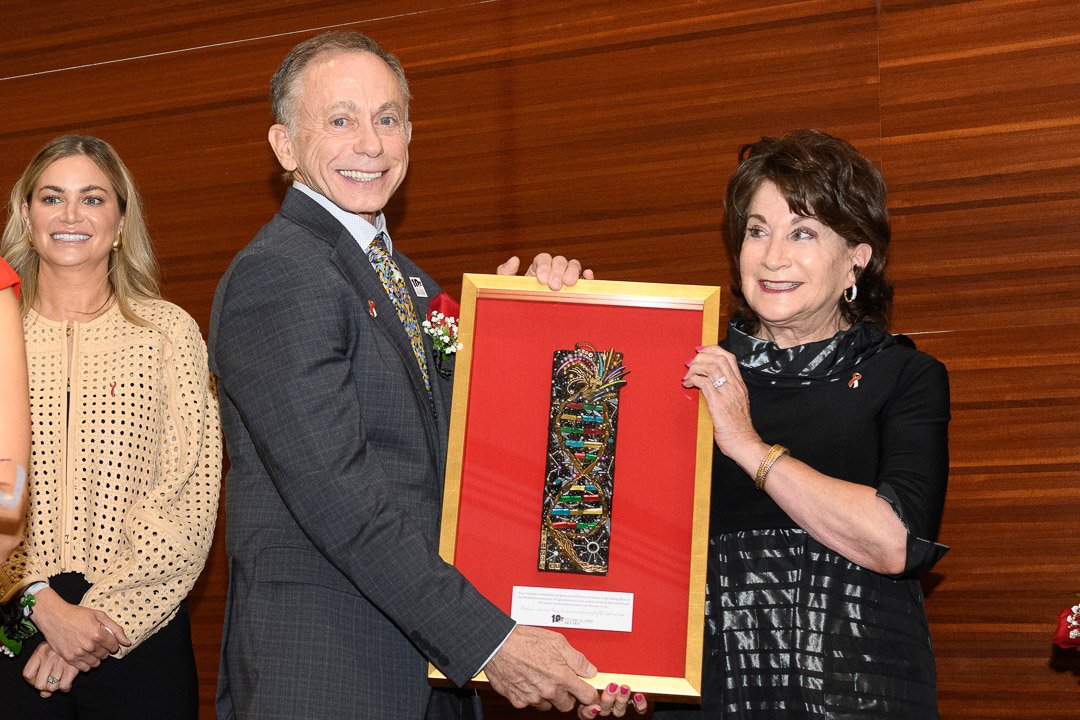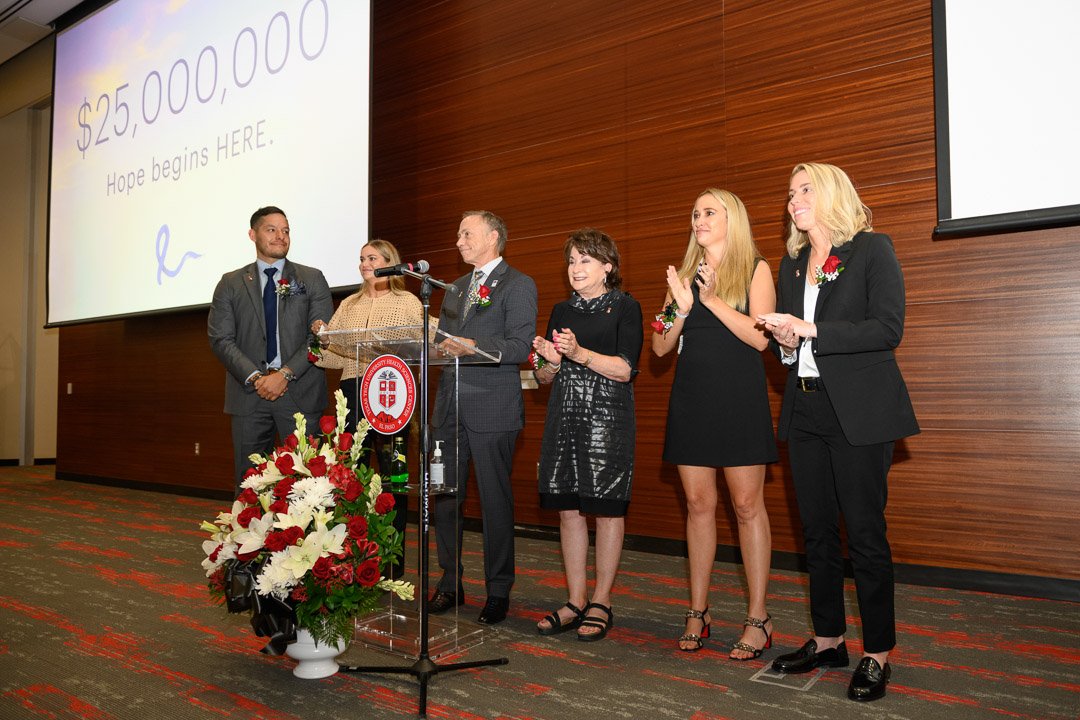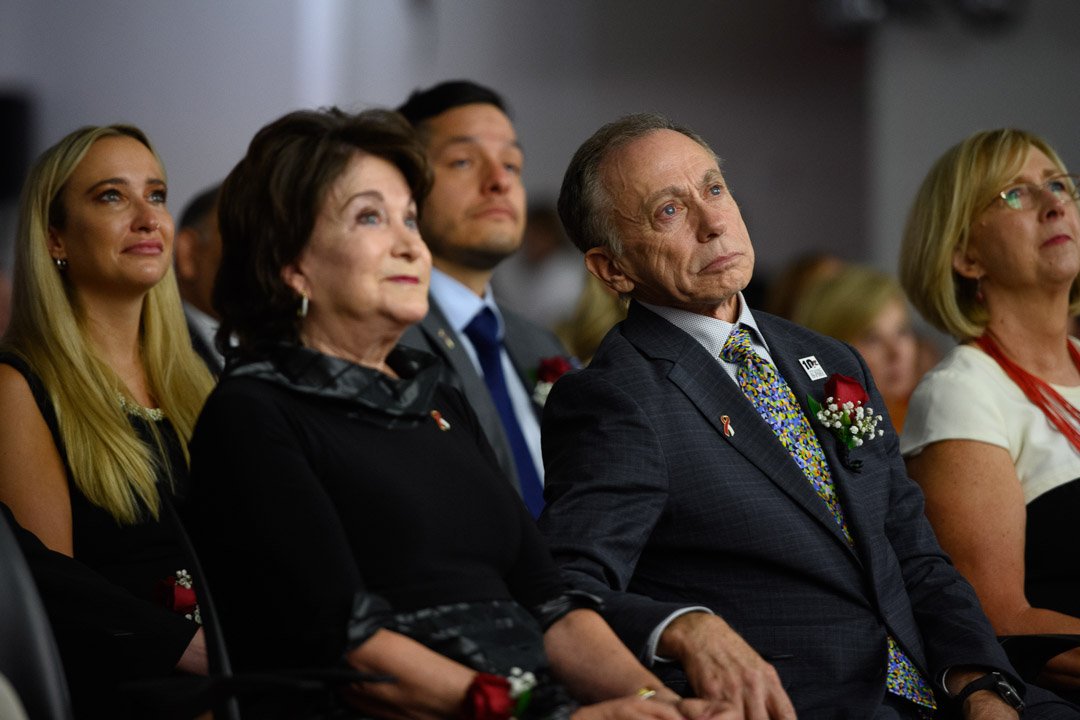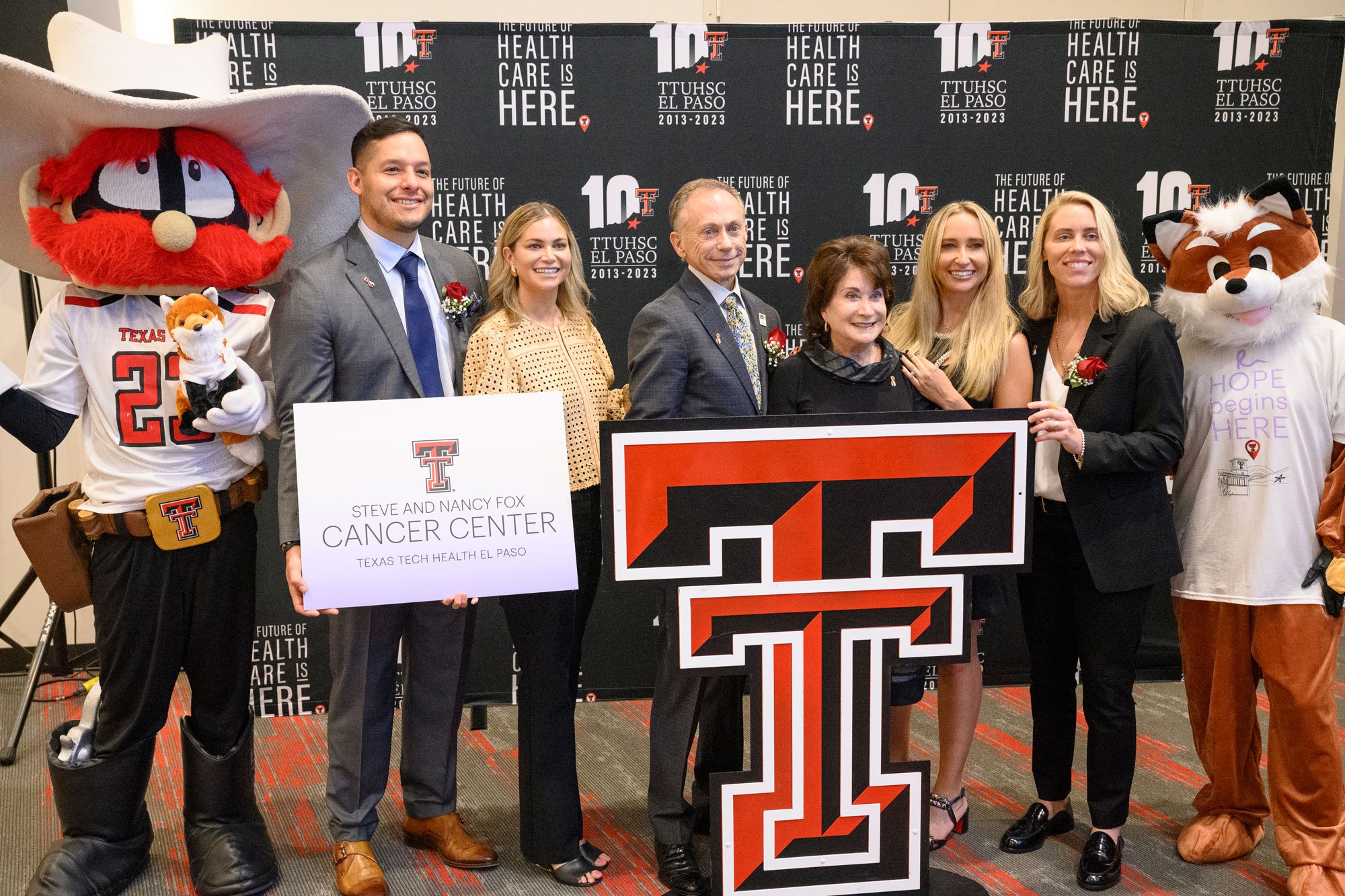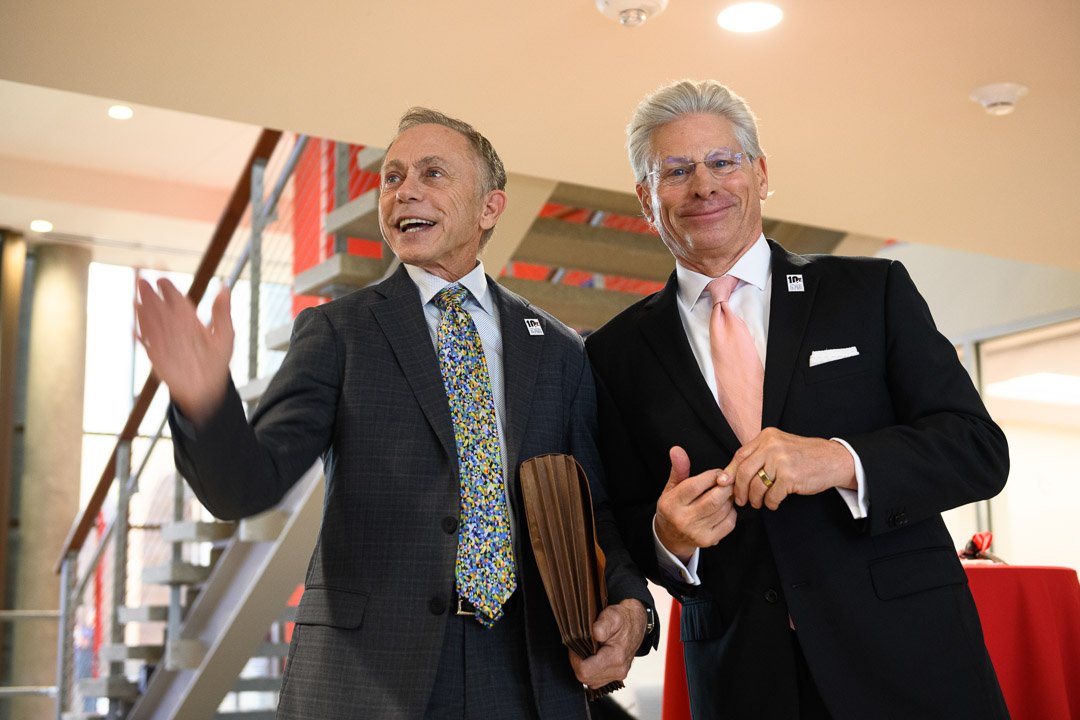El Pasoans of the Year
2023 El Pasoans of the Year: The Fox Family - philanthropists
Courtesy of El Paso Inc.
Nearly 25 years ago, Steve Fox began showing the first symptoms that would lead to a stage 4 cancer diagnosis. His treatment at MD Anderson in Houston planted the seed for Fox and his family to set off on a journey to improve health and cancer care in El Paso. In 2023, the Fox family – Steve, Nancy and their daughters Ashley and Paige – made a $25 million gift to Texas Tech University Health Sciences Center El Paso, to build a long-envisioned cancer center. Their monumental gift rallied past honorees to name them the 2023 El Pasoans of the Year.
When Steve Fox came to El Paso in 1975, El Paso was already a big, bustling city – especially for someone who grew up in Roswell, N.M.
Making $600 a month working for Bob Hoy, Fox had an inkling that he wanted to own his own car dealership one day. But he never envisioned that he’d be diagnosed with stage 4 head and neck cancer, or that he would have to travel nearly 750 miles one way to Houston for treatment.
Nobody can outline exactly how their life will turn out, but nobody gets off this planet without going through challenges. Fox and his family know this, but have let their dreams and faith keep them grounded.
The Fox family’s $25 million donation to Texas Tech University Health Sciences Center for El Paso’s cancer center has brought the city closer than ever to its goal of improving health care and patient outcomes close to home.
Fox and his family have supported many causes throughout the region, including the Tree of Life orphanage in Anapra and the Paso del Norte Health Foundation. But improving cancer care in El Paso became a calling for Steve Fox.
Steve and Nancy Fox spoke to El Paso Inc. about contributing to El Paso, walking through dark times and what they hope for the future of the cancer center.
Q: What kind of changes have you seen in El Paso in your lifetimes here?
Nancy: I was brought up when it was thriving. When the gas company left in the ’90s it went downhill. But because of the support of Paul Foster and Woody Hunt, it’s gone back to being a more thriving city. I love to see that, and the success of El Paso.
Steve: It’s been really fun to see El Paso go from a limited social city, with so few things it offered, that made it difficult to recruit people here. There’s more to life than work. They want to be able to do things.
With the redevelopment of Downtown, the Chihuahuas and Locomotives, UTEP becoming a wonderful institution with Texas Tech, we’re becoming a major community that can compete with the bigger markets. We didn’t have that before. We’re able to draw the top recruits now.
Q: When did your battle with cancer first enter your life?
Steve: I never really thought anything about cancer or major illness. I’ve been very blessed and had always been very healthy. I started developing some symptoms in 1999.
They went undiagnosed. I went to various doctors, and they could never really pinpoint what was wrong, but I knew something was wrong. I pursued other doctors to give me advice. One was Dr. Edward Goldman.
Dr. Goldman was the one who discovered I had cancer. To a large degree, he saved my life. He told me I had a very serious cancer, and that I needed to go to MD Anderson. I wasn’t really aware of the significance of that.
I went to MD Anderson, and was able to go through treatment. It was very difficult. Our daughters were about 13 and 11 at the time. They thought their father was going to die. It was an emotional time.
I had to be there by myself. It planted the seed then, that I was very fortunate to be able to go, that my partner Bob Hoy supported me, and that my family was able to stay here as a unit. But I really thought, what about the people who can’t do that?
Later, I had a chance to get more involved because of Myrna Deckert and Woody Hunt. They were working on some things and developing fundraising activities, and I thought that this is a calling for me and my life.
Q: Nancy, what was it like while Steve was going through treatment?
Nancy: It was frightening. A lot of prayers. I had to keep the unit together and make sure the girls continued school and a normal life.
Q: How long did your treatment last?
Steve: I went through radiation for seven weeks. I was in a clinical trial for a year after that. The total treatment period was about 15 months. In the clinical trial, I injected chemo into my leg three times a week. I was able to do it myself. I learned how to do it.
I needed to get back to work and try to normalize things for my family. That was my priority, to move forward, so my girls would feel more at peace and so they could move forward. They weren’t going to move forward until I could move forward.
The initial diagnosis was that my two-year survival rate was probably about 35%. That was pretty overwhelming. I didn’t really share that with Nancy or the girls. But I had to convince myself that I was going to be in that 35%.
I continued to grow, we bought a house at that time, and I thought, I’m going to be in that 35% to survive. I’m very grateful and thankful that I was, but it was difficult.
Q: What was your perspective of MD Anderson?
Steve: I did meet some other people who were going through the same treatment I was. Unfortunately, most of them did not survive. I wasn’t a VIP. I was just like everyone else, walking into MD Anderson. The good news is that the quality of treatment is the same for everyone.
It’s emotionally stressful, going through treatment. And physically it makes you very sick. When you really think about it, the best place to be is in your own home, in your own bed, with your family.
That was something that really stuck in my mind. This is so hard for people who have to travel. We had to make this quality of care more available in El Paso. That was a dream that was launched.
At our Toyota luncheon, I wanted to thank all the employees for allowing me, Nancy, Paige and Ashley to realize our dream of providing better health care in El Paso. Our names may be on the building, but their heart and soul are what made it possible for us to do this.
Q: What were those early conversations like with Myrna Deckert and Woody Hunt about what was needed?
Steve: I knew who Myrna Deckert was, but was not a personal friend. Ed Azar, I knew who he was. Myrna and Ed wanted to come visit me at the dealership. They said, “We want to ask you for a favor. We want you to donate a Mercedes-Benz.” They wanted to do a fundraiser for MD Anderson and knew I had been a patient.
Bob Hoy agreed, and we donated a Mercedes. More important than the donation was that we were putting out the word. I rolled up my sleeves and we put together a fundraiser, and I think we raised about $100,000 for MD Anderson and had about 600 people come to an event.
There are certain people in this community that not only donate money but donate time. The person that pops into my mind is Woody Hunt. It’s not just his financial resources, it’s his leadership. He was one of the people that had the vision.
We tried and tried to get MD Anderson to come to El Paso. I’m on the board of visitors and executive committee for MD Anderson. I participated in a lot of meetings and planning sessions, and have put a lot of work into this.
Our donation is significant and important, but I want to believe that the 20 years I’ve been an advocate for improving health care in El Paso is as important, if not more important.
All the presidents at MD Anderson, whether it was John Mendelsohn, Ron DePinho, or Dr. (Peter) Pisters, knew me very well. They all knew I was lobbying for them to come to El Paso. I was a heat-seeking missile. I was on them all the time.
I would say, MD Anderson is going to be a part of our cancer center here in El Paso. I don’t know to what degree. I do know that MD Anderson has been working with Jacob Cintron at UMC on some early planning. They did some market research that has been shared with Dr. (Richard) Lange at Texas Tech.
They have been behind the scenes helping us formulate our plan. We’re not satisfied. We’re telling them thank you, but that’s not enough. We need more. I was there in November, speaking with leadership. They said, “Steve, we hear you. We want to help. But you need to build the center first. We’ll come, but build the center.” I’m going to hold them to it.
Nancy: It’s like that movie, “Field of Dreams.” If you build it, they’ll come.
Q: What was it like in those early conversations with Texas Tech for this gift?
Nancy: We met with them and wanted to donate some money. They were so grateful, but we thought they needed a little more. So we had another meeting, then another meeting. Then we thought, OK, this is it. They were very nice.
Steve: To really help make this dream come true, they needed and wanted a significant philanthropic gift.
My family – Ashley and her partner Katie, and Paige and her husband Jonathan, we all met. This is a significant gift for us. It’s a stretch gift for us.
The girls and their families had to be tuned into this. They’re obviously thinking about what’s going to be left to them. But they were totally on board and supported this.
We went to Dr. Lange and said we wanted to step up. I want to compliment state Rep. Mary Gonzalez. She was instrumental in making all this happen. All we were trying to do was support her efforts.
We had so many people involved and trying to get funding, and we were successful. We have a long way to go. We’re not done. One of my favorite slogans was a Nike one from years ago that said, “There is no finish line.”
Q: What do you hope is on the horizon for the cancer center as it gets built up, in 10 or 20 years from now?
Nancy: Recruiting good doctors, and opening up for everybody in El Paso, and that it’s easy to get accepted into and have treatment done.
Steve: We’re going to have to attract and recruit superstars. The community’s growth that it’s had, we’re able to compete. We do have things to offer for quality of life.
Q: Cancer patients go through the toughest times in their lives, as you did as well. What is something that brought light to those dark moments?
Steve: When I was young, my mother took us to church every Sunday. We went to Bible school, Sunday school and church. I was frustrated as a kid. I wanted to go play.
My walk of faith is like everyone’s. It’s up and down and is not always true north. That’s human nature. But I remember distinctly when I was diagnosed with cancer, I was sincerely thanking my mother that she led me to Christ. I prayed and prayed, and I still pray.
Nancy: I have a strong faith, too. I grew up Catholic. Like Steve said, you have ups and downs. I’m trying to learn more and do the right thing in my life. It’s little things, and it gives me peace. I’m very happy I have a relationship with the Lord.
Steve: Nancy’s parents, Frank and Barbara Gorman, were really good role models for us both. They were very devout in their faith, but they were also devout to the community.
Q: What advice would you give to the next generation that wants to have the impact you and others have made?
Nancy: I think by being role models.
Steve: Take the inspiration and put it into action. Our daughter Paige has changed our company policy so our employees are paid to do something for the community. She takes a group to El Pasoans Fighting Hunger, and they love it.
I’m so proud of Paige for doing that, on her own. We see how Ashley is doing things to help. She’s making an impact on people who have mental challenges. You don’t get through life without challenges, so we’re very proud of our daughters. They have that spirit of wanting to give back.
When you have a dream, put your dream down in writing. Write it down. Don’t just visualize it.
Nancy: And don’t burn it.
Steve: Realize that your dream can change. It’s not set in concrete. You might want to be a better husband, or a better wife, or volunteer. But have something, have a vision.


